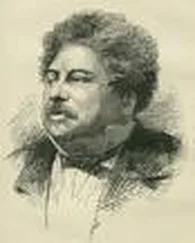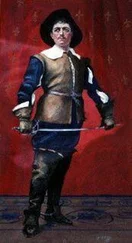Alexandre Dumas - Louise de la Valliere
Здесь есть возможность читать онлайн «Alexandre Dumas - Louise de la Valliere» — ознакомительный отрывок электронной книги совершенно бесплатно, а после прочтения отрывка купить полную версию. В некоторых случаях можно слушать аудио, скачать через торрент в формате fb2 и присутствует краткое содержание. Жанр: literature_19, foreign_antique, foreign_prose, на английском языке. Описание произведения, (предисловие) а так же отзывы посетителей доступны на портале библиотеки ЛибКат.
- Название:Louise de la Valliere
- Автор:
- Жанр:
- Год:неизвестен
- ISBN:нет данных
- Рейтинг книги:5 / 5. Голосов: 1
-
Избранное:Добавить в избранное
- Отзывы:
-
Ваша оценка:
- 100
- 1
- 2
- 3
- 4
- 5
Louise de la Valliere: краткое содержание, описание и аннотация
Предлагаем к чтению аннотацию, описание, краткое содержание или предисловие (зависит от того, что написал сам автор книги «Louise de la Valliere»). Если вы не нашли необходимую информацию о книге — напишите в комментариях, мы постараемся отыскать её.
Louise de la Valliere — читать онлайн ознакомительный отрывок
Ниже представлен текст книги, разбитый по страницам. Система сохранения места последней прочитанной страницы, позволяет с удобством читать онлайн бесплатно книгу «Louise de la Valliere», без необходимости каждый раз заново искать на чём Вы остановились. Поставьте закладку, и сможете в любой момент перейти на страницу, на которой закончили чтение.
Интервал:
Закладка:
“Not over-much, certainly.”
“Then there is nothing more to say?”
“I think not.”
“All your scruples are removed?”
“Quite so.”
“In that case I shall carry you off with me.”
“Exactly; and I will go and get my horse saddled.”
“You have horses here, then?”
“I have five.”
“You had them sent from Pierrefonds, I suppose?”
“No, M. Fouquet gave them to me.”
“My dear Porthos, we shall not want five horses for two persons; besides, I have already three in Paris, which would make eight, and that will be too many.”
“It would not be too many if I had some of my servants here; but, alas! I have not got them.”
“Do you regret them, then?”
“I regret Mousqueton; I miss Mousqueton.”
“What a good-hearted fellow you are, Porthos,” said D’Artagnan; “but the best thing you can do is to leave your horses here, as you have left Mousqueton out yonder.”
“Why so?”
“Because, by and by, it might turn out a very good thing if M. Fouquet had never given you anything at all.”
“I don’t understand you,” said Porthos.
“It is not necessary you should understand.”
“But yet – ”
“I will explain to you later, Porthos.”
“I’ll wager it is some piece of policy or other.”
“And of the most subtle character,” returned D’Artagnan.
Porthos nodded his head at this word policy; then, after a moment’s reflection, he added, “I confess, D’Artagnan, that I am no politician.”
“I know that well.”
“Oh! no one knows what you told me yourself, you, the bravest of the brave.”
“What did I tell you, Porthos?”
“That every man has his day. You told me so, and I have experienced it myself. There are certain days when one feels less pleasure than others in exposing one’s self to a bullet or a sword-thrust.”
“Exactly my own idea.”
“And mine, too, although I can hardly believe in blows or thrusts that kill outright.”
“The deuce! and yet you have killed a few in your time.”
“Yes; but I have never been killed.”
“Your reason is a very good one.”
“Therefore, I do not believe I shall ever die from a thrust of a sword or a gun-shot.”
“In that case, then, you are afraid of nothing. Ah! water, perhaps?”
“Oh! I swim like an otter.”
“Of a quartan fever, then?”
“I have never had one yet, and I don’t believe I ever shall; but there is one thing I will admit,” and Porthos dropped his voice.
“What is that?” asked D’Artagnan, adopting the same tone of voice as Porthos.
“I must confess,” repeated Porthos, “that I am horribly afraid of politics.”
“Ah, bah!” exclaimed D’Artagnan.
“Upon my word, it’s true,” said Porthos, in a stentorian voice. “I have seen his eminence Monsieur le Cardinal de Richelieu, and his eminence Monsieur le Cardinal de Mazarin; the one was a red politician, the other a black politician; I never felt very much more satisfied with the one than with the other; the first struck off the heads of M. de Marillac, M. de Thou, M. de Cinq-Mars, M. Chalais, M. de Bouteville, and M. de Montmorency; the second got a whole crowd of Frondeurs cut in pieces, and we belonged to them.”
“On the contrary, we did not belong to them,” said D’Artagnan.
“Oh! indeed, yes; for if I unsheathed my sword for the cardinal, I struck it for the king.”
“My good Porthos!”
“Well, I have done. My dread of politics is such, that if there is any question of politics in the matter, I should greatly prefer to return to Pierrefonds.”
“You would be quite right, if that were the case. But with me, my dear Porthos, no politics at all, that is quite clear. You have labored hard in fortifying Belle-Isle; the king wished to know the name of the clever engineer under whose directions the works were carried out; you are modest, as all men of true genius are; perhaps Aramis wishes to put you under a bushel. But I happen to seize hold of you; I make it known who you are; I produce you; the king rewards you; and that is the only policy I have to do with.”
“And the only one I will have to do with either,” said Porthos, holding out his hand to D’Artagnan.
But D’Artagnan knew Porthos’s grasp; he knew that, once imprisoned within the baron’s five fingers, no hand ever left it without being half-crushed. He therefore held out, not his hand, but his fist, and Porthos did not even perceive the difference. The servants talked a little with each other in an undertone, and whispered a few words, which D’Artagnan understood, but which he took very good care not to let Porthos understand. “Our friend,” he said to himself, “was really and truly Aramis’s prisoner. Let us now see what the result will be of the liberation of the captive.”
Chapter IV. The Rat and the Cheese
D’Artagnan and Porthos returned on foot, as D’Artagnan had set out. When D’Artagnan, as he entered the shop of the Pilon d’Or, announced to Planchet that M. du Vallon would be one of the privileged travelers, and as the plume in Porthos’s hat made the wooden candles suspended over the front jingle together, a melancholy presentiment seemed to eclipse the delight Planchet had promised himself for the morrow. But the grocer had a heart of gold, ever mindful of the good old times – a trait that carries youth into old age. So Planchet, notwithstanding a sort of internal shiver, checked as soon as experienced, received Porthos with respect, mingled with the tenderest cordiality. Porthos, who was a little cold and stiff in his manners at first, on account of the social difference existing at that period between a baron and a grocer, soon began to soften when he perceived so much good-feeling and so many kind attentions in Planchet. He was particularly touched by the liberty which was permitted him to plunge his great palms into the boxes of dried fruits and preserves, into the sacks of nuts and almonds, and into the drawers full of sweetmeats. So that, notwithstanding Planchet’s pressing invitations to go upstairs to the entresol , he chose as his favorite seat, during the evening which he had to spend at Planchet’s house, the shop itself, where his fingers could always fish up whatever his nose detected. The delicious figs from Provence, filberts from the forest, Tours plums, were subjects of his uninterrupted attention for five consecutive hours. His teeth, like millstones, cracked heaps of nuts, the shells of which were scattered all over the floor, where they were trampled by every one who went in and out of the shop; Porthos pulled from the stalk with his lips, at one mouthful, bunches of the rich Muscatel raisins with their beautiful bloom, half a pound of which passed at one gulp from his mouth to his stomach. In one of the corners of the shop, Planchet’s assistants, huddled together, looked at each other without venturing to open their lips. They did not know who Porthos was, for they had never seen him before. The race of those Titans who had worn the cuirasses of Hugh Capet, Philip Augustus, and Francis I. had already begun to disappear. They could hardly help thinking he might be the ogre of the fairy tale, who was going to turn the whole contents of Planchet’s shop into his insatiable stomach, and that, too, without in the slightest degree displacing the barrels and chests that were in it. Cracking, munching, chewing, nibbling, sucking, and swallowing, Porthos occasionally said to the grocer:
“You do a very good business here, friend Planchet.”
“He will very soon have none at all to do, if this sort of thing continues,” grumbled the foreman, who had Planchet’s word that he should be his successor. In the midst of his despair, he approached Porthos, who blocked up the whole of the passage leading from the back shop to the shop itself. He hoped that Porthos would rise and that this movement would distract his devouring ideas.
Читать дальшеИнтервал:
Закладка:
Похожие книги на «Louise de la Valliere»
Представляем Вашему вниманию похожие книги на «Louise de la Valliere» списком для выбора. Мы отобрали схожую по названию и смыслу литературу в надежде предоставить читателям больше вариантов отыскать новые, интересные, ещё непрочитанные произведения.
Обсуждение, отзывы о книге «Louise de la Valliere» и просто собственные мнения читателей. Оставьте ваши комментарии, напишите, что Вы думаете о произведении, его смысле или главных героях. Укажите что конкретно понравилось, а что нет, и почему Вы так считаете.












